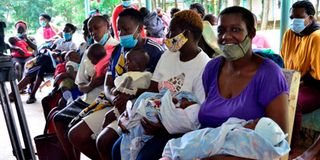Drones to help fight mosquitoes as war on malaria intensifies

Women line up with their babies at Yala Hospital in Siaya County for check-up and immunisation. Siaya is among the counties in western Keny ravaged by malaria.
The End Malaria Council Kenya with financial support from SC Johnson (an American multinational privately held manufacturer of household cleaning supplies and other consumer chemicals based in Racine, Wisconsin) has rolled out the use of biolarvicide drone sprays in effort to combat Malaria in the country.
The initiative was officially launched in Busia on Thursday to complement ongoing efforts by the Ministry of Health (MoH) after the government last year announced a Sh24 billion malaria war project spearheaded by Cuban and Kenyan experts in eight western Kenya counties.
The ten Cuban experts that MoH brought in and sent to Kakamega, Siaya, Kisumu, Bungoma, Busia, Vihiga, Homa Bay and Migori counties are also using biological methods and have started working.
This follows an agreement by Health Cabinet Secretary Mutahi Kagwe and Cuba’s Public Health Minister Jose Angel Portal Miranda signed in June 2021 for 101 specialists to work in Kenya under a two-year anti-malaria programme.
While demonstrating their initiative in Akiriamasit, Teso North constituency in Busia County, the End Malaria Council Committee said it is rolling it out with the aim of eliminating malaria.
According to Dr Willis Akhwale, a senior adviser at the African Leaders Malaria Alliance, Busia is the leading county in malaria infections in the country at 39 per cent.
Using drones
He said the team is using drones to spray the chemicals as some mosquito breeding grounds are not accessible by foot. Such areas include swamps and stagnant water in bushes.
“We use drones to map and identify mosquito breeding grounds. We then apply the same technology but with bigger drones that are able to carry 20 litres of chemicals to spray the areas identified,” he said.
Dr Akhwale added that the committee has been working with a group calling itself Malaria Youths Army to sensitise communities in Kenya on what should be done to eradicate the killer disease.
“The group was launched by President Uhuru Kenyatta last year to help us reduce malaria infections. Members of the group walk from door to door sensitising communities on staying safe from malaria,” Dr Akhwale said.
He said the chemical being used is safe, adding that spraying would continue in targeted areas every three months.
This is despite the fact that the World Health Organisation (WHO) in the past cautioned against the use of larvicides to control malaria in Sub-Saharan Africa.
“We are mapping and looking for specific breeding sites in these counties. Our target is the Lake region,” Dr Akhwale said.
“The council will also be considering improved housing for malaria control, which includes using netting material on windows and walls as well as paints that contain repellants.”
End Malaria Council in Kenya chairman Christopher Gitonga said the event was just the beginning of using biolarvicides and that the technology would be rolled out in the seven remaining western Kenya counties soon.
“Were you to test 200 people today, about 40 will be found with malaria,” he said.
“This is just the beginning of an initiative. We want to go around Kenya where malaria is endemic and make sure that over time we completely talk of a malaria-free country.”
He also urged the Ugandan government to begin spraying mosquito breeding zones.
“We should try some cross-border initiatives too. Mosquitoes do not know boundaries. We might be getting rid of them here but others are breeding in Uganda. Many will eventually migrate to Kenya,” he said.
Flooded rivers
Mr Romano Walunywa Omukaga, a community health worker in Akiriamasiti village, said his group was trained to fight malaria by identifying mosquito breeding zones and clearing them.
“The high number of cases in this village is due to the water that remains behind when flooded rivers recede. The water harbours mosquitoes,” Mr Omukaga said.
“Fortunately, we identify the breeding areas and remove the mosquito larvae. The new spraying technology is a big relief.”
In a past interview, head of the National Malaria Control Programme at the ministry, Dr George Githuka, told the Saturday Nation that the experts would start work in May or June.






